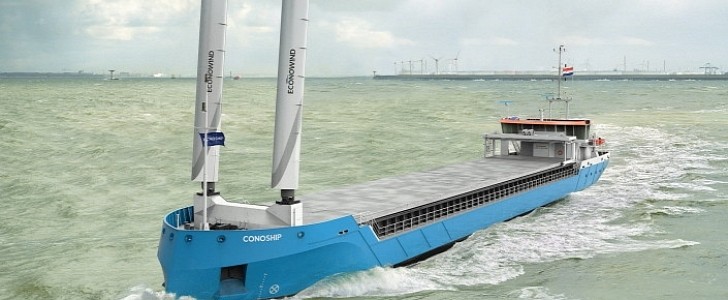The green wave is getting stronger in all mobility sectors, and this is just the beginning. As the global carbon neutrality 2050 deadline gets closer, regulations are most likely to become even harsher. If we’re talking about shipping and leisure boating, the International Maritime Organization (IMO) has already made things more challenging for ship operators and will continue to do so, in order to accelerate the transition to a cleaner industry.
Considering that regulations are only going to become harsher, designing and building vessels (and vehicles, in general) that take into account multiple ways of incorporating green technology is a way of “future-proofing” them. This is what the Netherlands-based naval design company Conoship is actively pursuing. Founded in 1952, Conoship offers a great example of what it means to build upon decades-old expertise, with an eye towards the future.
Its latest launch is a new fleet of cargo vessels that combine diesel-electric propulsion with modern wind-assisted propulsion. The new 3600 TDW cargo vessels are meant to boast a “future-proof design,” in the sense that not only are they ready to operate with clean energy alternatives, but they can also be adapted for additional green modification, in the future.
This Conoship sea-river coaster claims to offer the best fuel efficiency in its class, particularly in conditions of strong wind and waves, thanks to its optimized hull design, in conjunction with an enlarged propeller, and diesel-electric system. Plus, the ship has been designed for the additional placement of two Econowind Ventifoils, a modern sailing system that would reduce fuel consumption and CO2 emissions by an extra 10%.
The Energy Efficiency Design Index (EEDI) established by IMO regulates the minimum required level of efficiency for ships. The EEDI Phase 3, which will come into effect starting 2025, requires a 30% power reduction over the baseline. The new Conoship cargo vessel manages to score an EEDI 35% lower than the Phase 3 requirements, which means it’s ready to operate beyond 2025, as an ultra-fuel-efficient ship.
In addition to its hybrid propulsion and sailing system, the ship has been designed to be compatible with future alternative fuels, such as liquid hydrogen and ammonia, which will increase its eco-friendly impact.
The first six innovative sea-river coasters are being built at the Fosen Yard Emden in Germany, which considers it a flagship project that will inspire others to follow.
Its latest launch is a new fleet of cargo vessels that combine diesel-electric propulsion with modern wind-assisted propulsion. The new 3600 TDW cargo vessels are meant to boast a “future-proof design,” in the sense that not only are they ready to operate with clean energy alternatives, but they can also be adapted for additional green modification, in the future.
This Conoship sea-river coaster claims to offer the best fuel efficiency in its class, particularly in conditions of strong wind and waves, thanks to its optimized hull design, in conjunction with an enlarged propeller, and diesel-electric system. Plus, the ship has been designed for the additional placement of two Econowind Ventifoils, a modern sailing system that would reduce fuel consumption and CO2 emissions by an extra 10%.
The Energy Efficiency Design Index (EEDI) established by IMO regulates the minimum required level of efficiency for ships. The EEDI Phase 3, which will come into effect starting 2025, requires a 30% power reduction over the baseline. The new Conoship cargo vessel manages to score an EEDI 35% lower than the Phase 3 requirements, which means it’s ready to operate beyond 2025, as an ultra-fuel-efficient ship.
In addition to its hybrid propulsion and sailing system, the ship has been designed to be compatible with future alternative fuels, such as liquid hydrogen and ammonia, which will increase its eco-friendly impact.
The first six innovative sea-river coasters are being built at the Fosen Yard Emden in Germany, which considers it a flagship project that will inspire others to follow.





